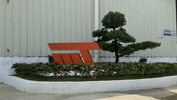Aluminum: The Ultimate Guide to Its Corrosion Resistance
Author:Jayminton Time:2024-07-16

Aluminum, a versatile and lightweight metal, stands out not only for its strength but also for its exceptional corrosion resistance. This property makes it indispensable in a wide range of applications across industries, from aerospace engineering to everyday consumer products. In this comprehensive guide, we delve into the factors behind aluminum's corrosion resistance, its applications, and how it is protected to ensure longevity and reliability.
Understanding Aluminum's Corrosion Resistance
Aluminum owes its impressive corrosion resistance primarily to its natural oxide layer. When exposed to air, aluminum immediately reacts to form a thin layer of aluminum oxide on its surface. This oxide layer acts as a protective barrier, preventing further oxidation and corrosion from moisture, oxygen, and other environmental elements. This inherent property makes aluminum highly durable in various environments, including marine and industrial settings where exposure to moisture and chemicals is common.
Applications Across Industries
Aerospace and Transportation
In the aerospace industry, where weight is a critical factor, aluminum's corrosion resistance makes it an ideal choice for aircraft components, including fuselages, wings, and structural elements. Its ability to withstand environmental extremes ensures the safety and longevity of aircraft, reducing maintenance costs and downtime.
In automotive manufacturing, aluminum's corrosion resistance plays a vital role in enhancing vehicle durability while maintaining fuel efficiency. Components such as body panels, wheels, and engine parts benefit from aluminum's lightweight and corrosion-resistant properties, contributing to improved performance and longevity of vehicles.
Construction and Architecture
In the construction sector, aluminum's corrosion resistance is crucial for building Facades, window frames, roofing systems, and structural components. Its durability and aesthetic appeal make it a preferred material for modern architectural designs, where sustainability and longevity are paramount considerations.
Marine and Offshore Structures
In marine environments, aluminum's resistance to corrosion makes it indispensable for boat hulls, ship components, offshore platforms, and marine infrastructure. Its lightweight nature and ability to resist saltwater corrosion ensure the structural integrity and operational efficiency of marine vessels and facilities.
Protecting Aluminum Against Corrosion
While aluminum boasts natural corrosion resistance, additional protective measures can further enhance its durability in demanding applications:
Anodizing: This electrochemical process thickens the natural oxide layer on aluminum, improving its resistance to corrosion and enhancing its aesthetic appeal with various color options.
Coatings: Applying coatings such as paints, polymer films, or powder coatings can provide an additional layer of protection against environmental factors, abrasion, and chemical exposure.
Alloy Selection: Choosing aluminum alloys with specific alloying elements (e.g., copper, magnesium) can enhance corrosion resistance for specialized applications where increased strength and durability are required.
Conclusion
Aluminum's corrosion resistance, coupled with its lightweight and versatile properties, makes it a material of choice across diverse industries. Whether in aerospace, automotive, construction, marine, or everyday consumer products, aluminum continues to prove its reliability and sustainability. Understanding its corrosion-resistant capabilities and implementing appropriate protective measures ensures that aluminum remains a cornerstone material in modern engineering and manufacturing.
In summary, aluminum's ability to resist corrosion not only extends the lifespan of products but also reduces maintenance costs and enhances performance, making it a cornerstone of modern engineering and manufacturing practices.

 S1 Clip-in Metal ceiling System
S1 Clip-in Metal ceiling System JMT-L4.2 U-Baffle System
JMT-L4.2 U-Baffle System JMT Aluminum Wall Cladding
JMT Aluminum Wall Cladding Aluminum Honeycomb Panel
Aluminum Honeycomb Panel Air-Condenser Cover
Air-Condenser Cover Metal Heat Cover
Metal Heat Cover Singapore Changi Airport T2 Arrival
Singapore Changi Airport T2 Arrival Australia Marvrl Stadium City Edge
Australia Marvrl Stadium City Edge Enterprise Information Announcement
Enterprise Information Announcement Construction Industry Solutions
Construction Industry Solutions About Jayminton
About Jayminton Contact US
Contact US